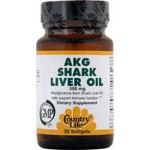
 Last year, we briefly discussed the myth that sharks don’t get cancer. This myth is easy to disprove, since sharks do, in fact, get cancer. The first cancerous tumor was discovered in a shark over 150 years ago and they have been discovered in more than twenty species. This year, I’m returning to the topic of shark medical myths.
Last year, we briefly discussed the myth that sharks don’t get cancer. This myth is easy to disprove, since sharks do, in fact, get cancer. The first cancerous tumor was discovered in a shark over 150 years ago and they have been discovered in more than twenty species. This year, I’m returning to the topic of shark medical myths.
Many parts of sharks have been utilized for their supposed medical benefits. Shark cartilage is sold as an over-the-counter alternative treatment for- you guessed it- cancer. One of the most ridiculous names it’s sold under as “BeneFin”. According to HowStuffWorks.com, the shark cartilage industry is worth over $25 million a year. The basic idea behind this is that since sharks don’t get cancer, if you eat ground up shark cartilage, your cancer will be treated.
Obviously this doesn’t hold up:
“Studies on mice and on humans in 1998 and 2005 found that taking an oral shark-cartilage supplement had no effect on cancerous tumors. Results indicated that it didn’t prevent the spread of cancer to other organs either”
Additionally, there are some nasty side effects.
“The study also found that taking the supplements led to some gastrointestinal side effects like diarrhea, nausea and vomiting. Shark cartilage also contains mercury, something doctors warn against because of its negative effects on the brain and kidneys.”
In short, shark cartilage has no beneficial effects whatsoever on tumors, and actually can be quite bad for you.

Shark liver oil,which contains a chemical called “squalene”, is also a common component of the alternative medicine trade. Squalene is believed to help treat cancer (sigh), as well as boost the immune system, helping to heal wounds, relieving pain and swelling, as well as treating various skin conditions. Squalene is actually a very common chemical, produced in low concentrations within our own bodies. The concentrations found in shark livers are much higher.
It actually works as a skin moisturizer…because it’s an oil. However, according to Shark Savers, ” it does not offer any advantages over sustainable plant based alternatives.” To date, there is no evidence that consuming this substance has any effect on cancer or the immune system in humans. According to the American Cancer Society, “available scientific evidence does not support claims that shark liver oil supplements are effective against cancer in humans.” Squalene itself is not harmful if ingested (again, it is produced naturally in the human body), but the squalene that comes from shark liver oil can sometimes contain high levels of contaminants like PBDEs. Shark liver oil has no benefits that can’t be obtained from other sources, and it can make you very sick if you get a PBDE contaminated batch. The PBDE-in-liver-oil study took place in Japan, but PBDEs have been found in sharks around the world.

Finally, shark fin soup, in addition to being a status symbol, is thought to increase virility in men. Obviously, there is no evidence of any kind supporting this. In fact, ironically, the opposite is true. Due to sharks’ status as apex predators, they often have dangerously high levels of mercury in their tissues. According to Shark Savers, “Mercury has been shown to lower sperm count or can even cause sterility in men.”
There are a lot of misconceptions about the medical benefits that shark products can provide. There are also a lot of amazing actual medical benefits from sharks and shark products that researchers have discovered (more on this in another post soon). The best way to tell the difference is to see who is recommending the product. If it’s a doctor, and they can show you scientific, clinical research supporting their claims, it’s probably a good bet. If it’s someone who preaches about how “natural” products are somehow inherently better than modern medicine, you should run, very fast and very far away.
Besides low sperm count, ingesting food with high mercury content can cause erectile dysfunction. Those that feel the need to ingest shark fin soup to increase their virility, will do better ingesting the little blue pill.
Interesting you didn’t mention the recent paper on squalamine, which does show some potential as an antiviral agent. It can be synthesized, so it doesn’t even have to come directly from sharks, getting around the issues of sustainability and mercury contamination. Which is really the only way I’d support a shark-based cure myself.
And I quote:
“There are also a lot of amazing actual medical benefits from sharks and shark products that researchers have discovered (more on this in another post soon).”
Stay tuned.